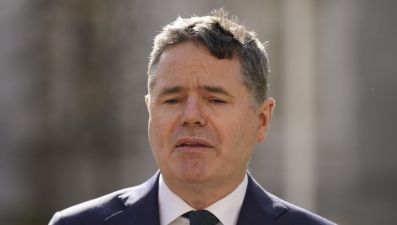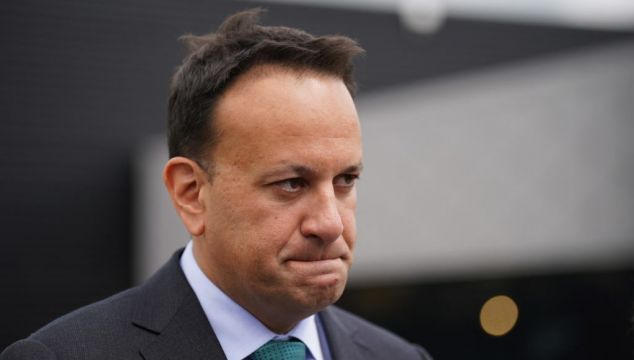A senior barrister who reviewed Ireland’s abortion laws has expressed disappointment at the Taoiseach and Tánaiste’s response to her recommendations and suggested “a bit of courage wouldn’t go amiss”.
Marie O’Shea recommended a series of operational and legislative changes to the system introduced after the country voted to liberalise its laws on terminations in the landmark referendum in 2018.
While the Government is pressing ahead with the operational recommendations, it has referred the legislative proposals to the Oireachtas’s health committee for consideration.
Among the recommendations is the removal of a mandatory three-day waiting period between a woman’s initial medical consultation and her being given access to abortion treatment or medication.
The review also recommends the threat of criminal sanction is removed for medics found to have acted outside the provisions of the abortion legislation and that the HSE is given the ability to ensure the provision of services is not disrupted due to issues around conscientious objections held by healthcare staff.
Responding to the initial publication of the review, Taoiseach Leo Varadkar and Tánaiste Micheál Martin welcomed Ms O’Shea’s work, but both expressed caution around moving to significantly change the legal framework that people believed would be implemented when they voted in the referendum, which overturned the near blanket ban on abortions enshrined in the constitution’s Eighth Amendment.
Appearing before TDs and senators on the health committee on Wednesday, the barrister said she was aware of concerns voiced by senior members of the Government that changing the legislation would be “perceived as tantamount to a breach of promise with the electorate”.
She added: “I think it is reasonable to say that among the 66.4% of those who voted in favour of repeal of the eighth amendment were people who would have been influenced by the scope of the proposed regulations.
“They may hold genuine fear that the recommendations contained in the report represent the start of a creep towards a more progressive termination of pregnancy regime.
“I want to assure this committee that that is not the purpose of the recommendations. I believe that the electorate could not have foreseen the difficulties that would arise in operationalising the Act.”
She highlighted that the legislation included a specific provision for reviewing the operation of the Act.
“My hope is that the review will lead to legislative change. This will require strong leadership and courage from the Government,” she said.
Later, Independent TD Michael McNamara asked about her call for political courage and leadership.
Ms O’Shea replied: “Well, based on the comments of the Tanaiste and the Taoiseach and their perceived reluctance as I found it to interfere with the legislation or amend the legislation, I think that a bit of courage wouldn’t go amiss.”
Mr McNamara asked whether politicians could equally show courage by not accepting her recommendations.
He added: “Do you think that people whose views you don’t agree with can also be courageous and demonstrate leadership?”
Ms O’Shea responded by insisting her recommendations were based on evidence, not her personal opinion.
“My views are not the views that are expressed in the report,” she said.
“They are evidence based, and this country has to respond to the needs of the people, democracy is the will of the people. The terms of reference were set down by the Department of Health. I think they were very good. They have shown an evidence base. What else is the Government going to go on except the evidence?”
The framework introduced after the referendum provides for unrestricted access to abortion up to 12 weeks in term.
After that point, terminations are allowed in certain circumstances, such as in cases of fatal foetal abnormalities and when there is a risk to the wellbeing of the expectant mother.
The review has recommended several changes to the system for determining when abortions can be granted post 12 weeks.
Ms O’Shea said the Government had a legal duty to ensure Ireland lived up to its international commitments on abortion provision.
“Any time we sign up to an international convention, we’re supposed to interpret our law in a way that is consistent with the obligations under that convention, and I think this Act is falling far short of that.”
She suggested that if changes were not made, the Government could face legal challenges, with the prospect of the Taoiseach of the day finding themselves having to make an apology in the Dáil and the state having to pay compensation.
During Leaders’ Questions in the Dáil later on Wednesday, public expenditure minister Paschal Donohoe was asked by Labour leader Ivana Bacik when the Government would implement the operational and legislative recommendations.

“We’re all aware of the huge importance of this as a healthcare policy and also aware of the important report that the Government and Oireachtas received on the matter,” he said.
“In relation to the operational points that you raised, we in the Government appreciate their seriousness. We have requested now that the HSE put in place an implementation group to respond back to the very important operational issues that have been raised in the provision of this vital care service to women.
“In relation to the legislative changes that you’re referring to, the Government has decided, and I do think this is appropriate, that we allow the Oireachtas to consider the report first, and then the Government will … reach a considered response back to the report that’s been brought forward.”







